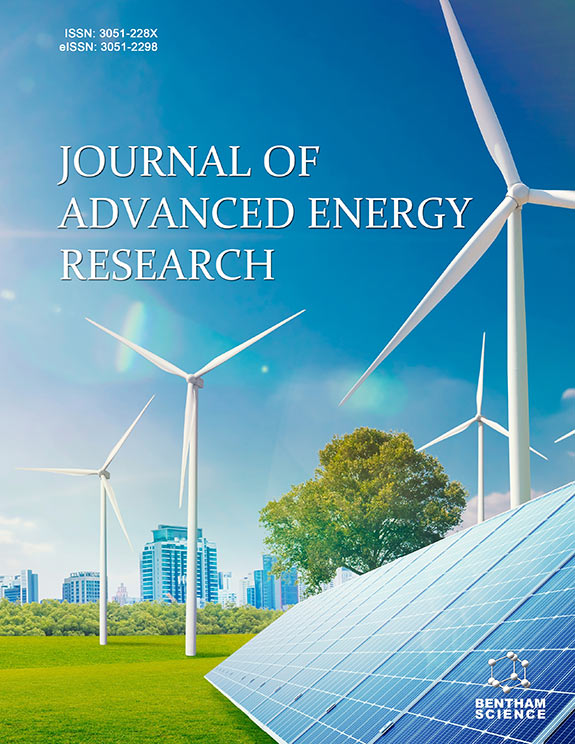
Journal of Advanced Energy Research
Journal Sub Title: Innovations for Sustainable Power, Storage, and Systems.
The journal welcomes original research articles, reviews, short communications, and perspectives in (but not limited to) the following areas:
-
Renewable Energy Technologies
- Solar photovoltaic and thermal systems
- Wind and hydropower energy systems
- Geothermal, ocean, and tidal energy
- Bioenergy and advanced biomass conversion
- Electrochemical storage: batteries, supercapacitors
- Hydrogen production, storage, and fuel cells
- Thermal and mechanical storage solutions
- Novel materials for energy conversion systems
- Photocatalysts, thermoelectrics, and piezoelectrics
- Nanostructured materials for energy devices
- Perovskite and organic photovoltaic materials
- Materials for extreme environments (e.g., nuclear, high-temperature)
- Cleaner coal and natural gas technologies
- Carbon capture, utilization, and storage (CCUS)
- Low-emission combustion systems and emissions reduction
- Fission reactor development and safety
- Fusion energy research and reactor design
- Spent fuel management and nuclear materials
- Advances in small modular reactors (SMRs)
- Building and industrial energy optimization
- Smart grids, microgrids, and demand-response systems
- Waste heat recovery and cogeneration
- Energy-efficient devices and appliances
- Policy frameworks for energy transitions
- Environmental and economic impact assessments
- Energy access and equity in developing regions
- Global trends in sustainable development and decarbonization
- Energy policy and investment strategies in emerging markets
- Power generation, transmission, and distribution
- Renewable integration and grid stability
- Electrification of transport and rural areas
- Resilient and decentralized energy systems
- Artificial intelligence and machine learning in energy system optimization
- Digital transformation applications in energy generation, storage, and management
- Hybrid and integrated energy systems supporting green transformation
- Blockchain for energy trading and cybersecurity
- Quantum energy technologies
- New developments in energy devices and smart applications
- Cross-sectoral innovations (e.g., agri-energy, water-energy nexus)
Energy Storage & Conversion
Advanced Energy Materials
Fossil Fuels and Clean Combustion
Nuclear Energy
Energy Efficiency and Smart Systems
Energy Policy, Economics & Sustainability
Energy Infrastructure and Systems
Emerging and Interdisciplinary Energy Technologies
Journal of Advanced Energy Research is an international, peer-reviewed journal on all aspects of alternative energy published continuously (print & online) by Bentham Science Publishers.
Editor-in-Chief:
-
Adnan Sozen Energy Systems Engineering Technology
Gazi University
Ankara
Türkiye
ISSN: 3051-228X (Print)
eISSN: 3051-2298 (Online)
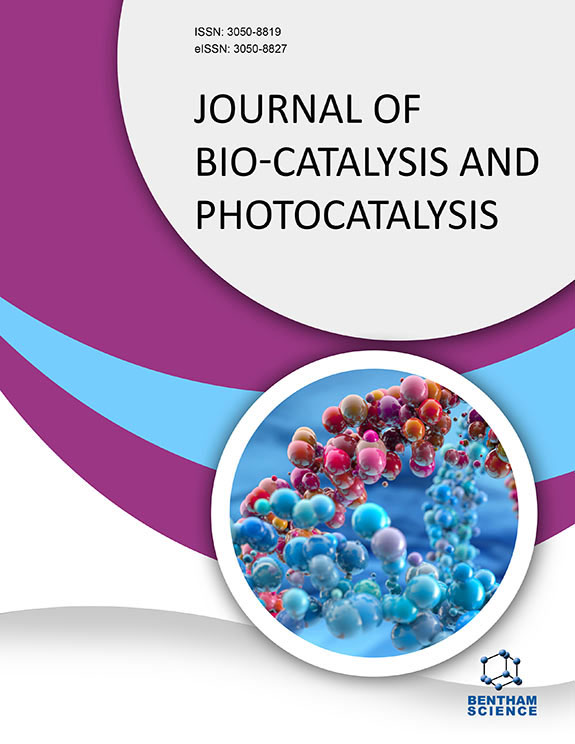
Journal of Bio-catalysis and Photocatalysis
Indexed in: Cabell's Directory/Journalytics
View AllJournal of Bio-catalysis and Photocatalysis would accept novel papers in the following fields:
- Enzyme Catalysis
- Enzyme Engineering
- Immobilization of Biocatalysts
- Biotransformations
- Industrial Biocatalysis
- Green Chemistry and Sustainable Biocatalysis
- Biocatalysis in Chemical Synthesis
- Biocatalysis in Biotechnology
- Biocatalysis in Environmental Applications
- Computational Biocatalysis
- Biocatalysis in Medicinal Chemistry
- Preparation and characterization of new photocatalyst.
- Photocatalytic elimination of environmental pollutants in liquid or gas phase.
- Self-cleaning materials.
- Thin films.
- Photocatalytic syntheses of valuable products.
- Photocatalytic hydrogen generation and CO2 reduction.
- Kinetics and mechanistic aspects of photocatalytic reactions.
- Combination of photocatalysis with other technologies, such as membrane technologies and photoelectrocatalysis.
- Engineering aspects of photocatalytic processes.
- Homogeneous photocatalysis.
- Theory, modeling, and computational aspects regarding the mechanisms of activation of photocatalysis
- Photovoltaics
- Photcatalic Sensors
- Photcatalic Degradation
- Photcatalic Carbon-capture
- Photcatalic Oxidative Degradation
- Photocatalytic Materials and Nanomaterials
- Photocatalysis in Energy Conversion
- Environmental Applications of Photocatalysis
- Photocatalysis for Sustainable and Green Chemistry
- Photoelectrochemistry and Photocatalytic Systems
- Characterization and Mechanistic Studies in Photocatalysis
- Photocatalysis in Biomedical Applications
- Theoretical and Computational Photocatalysis
- Photocatalysis in Industrial Applications
- Solar Photocatalysis and Solar Cells
Editor-in-Chief:
-
Christos Argirusis
Laboratory of Inorganic Materials Technology (LIMT)
School of Chemical Engineering
National Technical University of Athens
Athens
Greece
ISSN: 3050-8819 (Print)
eISSN: 3050-8827 (Online)
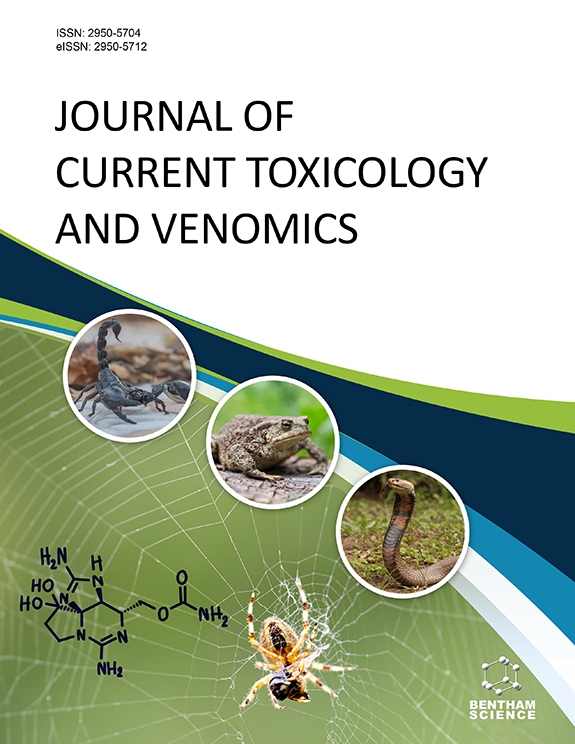
Journal of Current Toxicology and Venomics
Editor-in-Chief:
-
Jean-Marc SabatierInstitute of NeuroPhysiopathology
Aix-Marseille University
Marseille
France
ISSN: 2950-5704 (Print)
eISSN: 2950-5712 (Online)
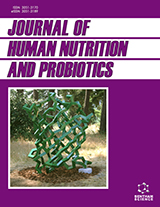
Journal of Human Nutrition and Probiotics
- Dietary intake
- Nutrition and Disease
- Eating Disorders
- Macronutrients
- Micronutrients
- Nutritional Policy
- Nutritional Epidemiology
- Nutrigenomics
- Nutrigenetics
- Plant Probiotics
- Preservation techniques
- Probiotic species
- Probiotic supplements
- Probiotics and Food Industry
- Probiotics and Immune System
- Probiotics and Marine life
- Probiotics and Prebiotics
- Probiotics as Biological Drugs
- Probiotics for Human Health
- Probiotics Genome
- Probiotics Sources
Editor-in-Chief:
-
Spiros ParamithiotisDepartment of Biological Applications and TechnologyUniversity of IoanninaIoanninaGreece
ISSN: 3051-3170 (Print)
eISSN: 3051-3189 (Online)
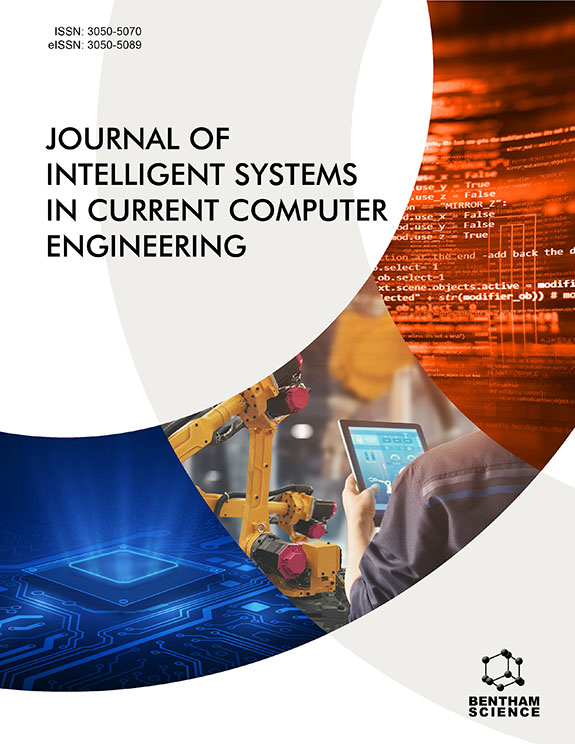
Journal of Intelligent Systems in Current Computer Engineering
Original research articles and reviews in the following areas of intelligent systems in the field of computer engineering are of special interest to the readers of this journal:
- Big Data
- Cloud Computing
- Computer Vision
- Cybersecurity
- Data Mining
- Digital Twins
- Expert Systems
- Fuzzy logic
- Fuzzy Set Extensions
- Heuristics
- Intelligent Agents
- Internet of Things
- Logical reasoning
- Machine Learning and Deep Learning
- Metaheuristics
- Natural Language Processing (NLP)
- Reinforcement Learning
- Robotics and Autonomous Systems
- Support Vector Machines
Editor-in-Chief:
-
Cengiz KahramanDepartment of Industrial Engineering
Istanbul Technical University
Istanbul
Türkiye
ISSN: 3050-5070 (Print)
eISSN: 3050-5089 (Online)



